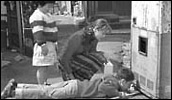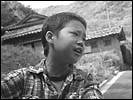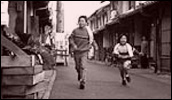My House
- Year
- 2002
- Original title
- Bokunchi
- Japanese title
- ぼくんち
- Alternative title
- Bokunchi - My House
- Director
- Cast
- Running time
- 116 minutes
- Published
- 20 September 2003



by Tom Mes
Set in a rundown little harbour town on an unnamed island, Bokunchi is the story of 7-year old Nita (Tanaka) who lives with his older brother Itta (Yamoto) and their mother. Mom has been away on a trip for the past six months, leaving the two boys to fend for themselves.
Since the entire population of the island is chronically short of cash, the boys' own lack of funds is hardly an obstacle in their daily lives. Nita spends much of his time with Scrap Gramps (action film veteran Shiga, recently seen as the enka-singing cop in Takashi Miike's Deadly Outlaw: Rekka), a middle-aged man who lives a sheltered life in a shack on the edge of town. Despite his hermit status, Scrap Gramps's eccentricities are hardly exceptional compared to those of the townsfolk, which include an old lady tending to dozens of cats, a noodle restaurant run by the world's worst cook and a young delinquent named Kôichi (Maki, best known for playing Takeshi Kitano's Brother) who fancies himself a yakuza, but whose misdeeds remain limited to an occasional act of solitary vandalism and a big mouth.
The two little boys are so used to taking care of themselves, that when their mother finally returns home, they simply ignore her presence and continue about their business. However, one thing certainly arouses their curiosity: the young woman accompanying their mother. Introduced to the boys as their half-sister Kanoko, she soon takes over the household, and becomes more of a mother to them than their actual mother ever was. Particularly when the latter leaves on another of her mysterious trips, taking the deed to the house with her. But where Nita warms to Kanoko, Itta rejects her and starts spending more and more time with Kôichi the solitary delinquent.
Though essentially a coming-of-age tale, Bokunchi is refreshingly short on sentimentality. Adapting Rieko Saibara's manga, Sakamoto shows life in the rundown town with the necessary rough and tumble, and doesn't spare his two young leads from receiving their dose. His portrayal of growing up in the sticks doesn't flinch from showing the rougher aspects but at the same time with a good deal of stylisation. With the film's numerous eccentric characters and its indistinct setting, Bokunchi is almost carnivalesque in appearance, but its characters use their quirkiness and humour as means of survival, a way to deal with their deprived existence.
With the film having no real-life social or historical context, Sakamoto is free to apply stylisation. There is no need to remain true to fact, which gives the director a lot of leeway, which he in turn uses sensibly. The undertone to the comedy remains consistently tragic. The lesson Scrap Gramps teaches Nita, to always grin in the face of adversity, results in affectionate mugging from the little boy (endearingly played by the young Tanaka), but always points to the presence of that same adversity.
In the end, it all serves to show how poverty causes two little boys to mature before their age, which points exactly to how much director Junji Sakamoto has developed as a filmmaker from his early days, when every film he made was either about boxing (Knock-Out / Dotsuitarunen (1989) Metallic Boxer / Tekken (1990), Boxer Joe (1995)) or about guys roughing it up as women stood by the sidelines (Tokarev, 1994) and the two Battered Angels / Kizudarake No Tenshi (1997/'98) buddy movies). Ever since snapping up most of Japan's film prizes with Face (Kao, 1999), Sakamoto's films have become more balanced and have started to explored some touchy and topical subjects. With the charged political drama KT, the charming Bokunchi and Out of this World (Kono Yo no Soto e: Club Shinchugun), he has turned into one of Japan's most versatile filmmakers.